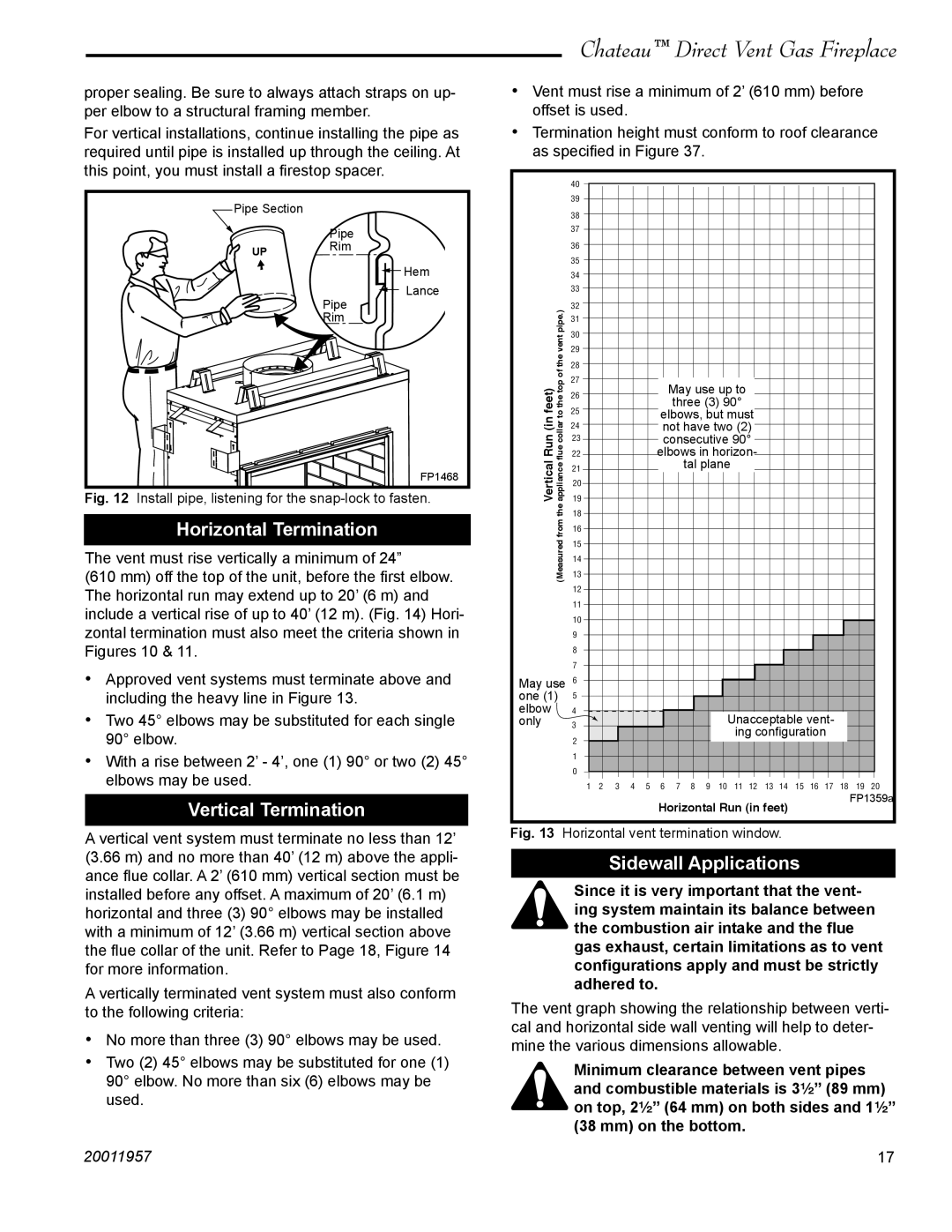
proper sealing. Be sure to always attach straps on up- per elbow to a structural framing member.
For vertical installations, continue installing the pipe as required until pipe is installed up through the ceiling. At this point, you must install a firestop spacer.
Chateau™ Direct Vent Gas Fireplace
•Vent must rise a minimum of 2’ (610 mm) before offset is used.
•Termination height must conform to roof clearance as specified in Figure 37.
Pipe Section
| Pipe |
UP | Rim |
| |
| Hem |
| Lance |
| Pipe |
| Rim |
FP1468
Fig. 12 Install pipe, listening for the snap-lock to fasten.
Horizontal Termination
The vent must rise vertically a minimum of 24”
(610 mm) off the top of the unit, before the first elbow. The horizontal run may extend up to 20’ (6 m) and include a vertical rise of up to 40’ (12 m). (Fig. 14) Hori- zontal termination must also meet the criteria shown in Figures 10 & 11.
•Approved vent systems must terminate above and including the heavy line in Figure 13.
•Two 45° elbows may be substituted for each single 90° elbow.
•With a rise between 2’ - 4’, one (1) 90° or two (2) 45° elbows may be used.
Vertical Run (in feet) (Measured from the appliance flue collar to the top of the vent pipe.)
May use one (1) elbow only
�� |
| |
�� |
| |
�� |
| |
�� |
| |
�� |
| |
�� |
| |
�� |
| |
�� |
| |
�� |
| |
�� |
| |
�� |
| |
�� |
| |
�� |
| |
�� | May use up to | |
�� | ||
three (3) 90° | ||
�� | ||
elbows, but must | ||
| ||
�� | not have two (2) | |
�� | consecutive 90° | |
�� | elbows in horizon- |
��tal plane
�� |
|
|
|
|
|
|
|
| |
|
|
|
|
|
|
|
| ||
�� |
|
|
|
|
|
|
| ||
|
|
|
|
|
|
| |||
�� |
|
|
|
|
|
|
| ||
|
|
|
|
|
|
| |||
�� |
|
|
|
|
|
|
| ||
|
|
|
|
|
|
| |||
�� |
|
|
|
|
|
|
| ||
|
|
|
|
|
|
| |||
�� |
|
|
|
|
|
|
| ||
|
|
|
|
|
|
| |||
�� |
|
|
|
|
|
|
| ||
|
|
|
|
|
|
| |||
�� |
|
|
|
|
|
|
| ||
|
|
|
|
|
|
| |||
�� |
|
|
|
|
|
|
| ||
|
|
|
|
|
|
| |||
�� |
|
|
|
|
|
|
| ||
|
|
|
|
|
|
| |||
� |
|
|
|
|
|
|
| ||
|
|
|
|
|
|
| |||
� |
|
|
|
|
|
|
| ||
|
|
|
|
|
|
| |||
� |
|
|
|
|
|
|
| ||
|
|
|
|
|
|
| |||
� |
|
|
|
|
|
|
| ||
|
|
|
|
|
|
| |||
� |
|
|
|
|
|
|
|
|
|
��� |
|
|
|
|
|
|
| ||
|
|
|
| Unacceptable vent- |
| ||||
��� |
|
|
|
| |||||
|
|
|
| ing configuration | |||||
� |
|
|
|
| |||||
|
|
|
|
|
|
| |||
� |
|
|
|
|
|
|
| ||
|
|
|
|
|
|
| |||
� |
|
|
|
|
|
|
| ||
|
|
| � � � � � � � � � �� �� �� �� �� �� �� �� �� �� �� | ||||||
Vertical Termination
Horizontal Run (in feet)
FP1359a
A vertical vent system must terminate no less than 12’ (3.66 m) and no more than 40’ (12 m) above the appli- ance flue collar. A 2’ (610 mm) vertical section must be installed before any offset. A maximum of 20’ (6.1 m) horizontal and three (3) 90° elbows may be installed with a minimum of 12’ (3.66 m) vertical section above the flue collar of the unit. Refer to Page 18, Figure 14 for more information.
A vertically terminated vent system must also conform to the following criteria:
•No more than three (3) 90° elbows may be used.
•Two (2) 45° elbows may be substituted for one (1) 90° elbow. No more than six (6) elbows may be used.
Fig. 13 Horizontal vent termination window.
Sidewall Applications
Since it is very important that the vent- ing system maintain its balance between the combustion air intake and the flue gas exhaust, certain limitations as to vent configurations apply and must be strictly adhered to.
The vent graph showing the relationship between verti- cal and horizontal side wall venting will help to deter- mine the various dimensions allowable.
Minimum clearance between vent pipes and combustible materials is 3¹⁄₂” (89 mm) on top, 2¹⁄₂” (64 mm) on both sides and 1¹⁄₂” (38 mm) on the bottom.
20011957 | 17 |
